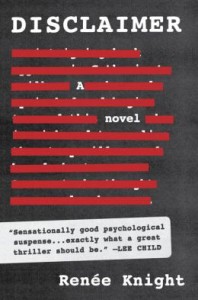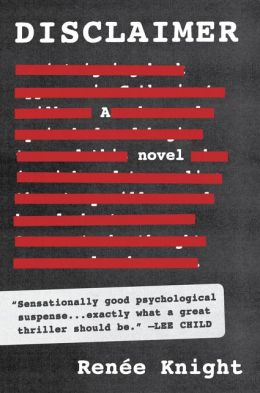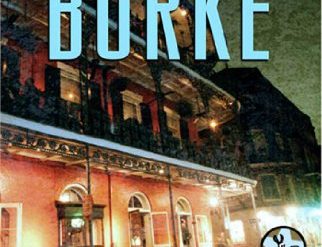
Mystery and thriller writers employ a wide variety of recognizable devices to create suspense and make their novels hard to put down. The most annoying of these are the clumsy clues sprinkled throughout whodunits and the deliberately misleading omission of facts known to a central character. None of that hits the reader in the face in Disclaimer, a recent novel by the British novelist Renee Knight.
Disclaimer is straightforwardly constructed in alternating chapters and shifting time periods from the point of view of its two principal characters, Catherine Ravenscroft and Stephen Brigstocke. The story is set in 2013, with flashbacks to 1993 and other times in the past. Catherine, the mother of a five-year-old who died twenty years earlier, is married to a successful lawyer, Robert Ravenscroft. They live comfortably in a toney London neighborhood. Stephen is a retired teacher whose beloved wife, Nancy, died seven years earlier; their only child, a son named Jonathan, had died at the age of 19, many years earlier. Stephen scrapes by on a pension.
The story opens when Catherine discovers that an unfamiliar book has mysteriously turned up in her house — and “stumble[s] across herself tucked into” its pages. “Names may have been changed but the details are unmistakable, even down to what she was wearing that afternoon. A chunk of her life she has kept hidden.” As the tale unfolds, we learn more and more about what happened that afternoon and how Stephen is connected to the mysterious book.
Disclaimer by Renee Knight ★★★★☆
Disclaimer is billed as a psychological thriller, and it lives up to that billing. The book is indeed suspenseful, the underlying mystery deeply puzzling. The Telegraph termed Disclaimer “suburban noir,” comparing it to the runaway bestseller Gone Girl, and the Guardian included it among its list of best recent crime novels. Though I think the book is a noble effort, I wouldn’t go that far: in the concluding chapters I found it progressively more difficult to continue reading, as the actions of all the characters seemed to me to be irrationally exaggerated. Unfortunately, the story wouldn’t have worked had that not been the case. It’s always something, right?
For more great reading
You might also enjoy my posts:
- Top 10 mystery and thriller series
- 20 excellent standalone mysteries and thrillers
- 30 outstanding detective series from around the world
- Top 20 suspenseful detective novels
- Top 10 historical mysteries and thrillers reviewed here
And you can always find my most popular reviews, and the most recent ones, on the Home Page.


























